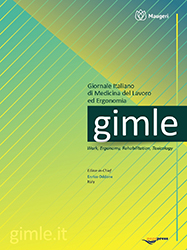[Impact of outpatient cardiac rehabilitation on the return to work of patient with cardiovascular diseases]
All claims expressed in this article are solely those of the authors and do not necessarily represent those of their affiliated organizations, or those of the publisher, the editors and the reviewers. Any product that may be evaluated in this article or claim that may be made by its manufacturer is not guaranteed or endorsed by the publisher.
Authors
Cardiovascular diseases are the leading cause of morbidity and mortality in developed countries and about 50% of myocardial infarctions occur in working age individuals. Return to work rates are determined by cardiovascular parameters as well as by psychosocial factors and a Cardiac Rehabilitation program after an acute coronary syndrome or coronary revascularization has shown to improve the cardiovascular outcome, occupational recovery and professional reintegration through a multidisciplinary intervention including physical exercise, lipid and blood pressure control, smoking cessation program, nutritional advice, psychological counselling and target-driven pharmacological therapies. The collaboration between cardiologist and occupational physician is crucial in the transition from illness to an active social position defining the work eligibility with the assessment of cardiological profile, comorbidities, psychological functions, worker's ability and functional capacity.
How to Cite

This work is licensed under a Creative Commons Attribution-NonCommercial 4.0 International License.
PAGEPress has chosen to apply the Creative Commons Attribution NonCommercial 4.0 International License (CC BY-NC 4.0) to all manuscripts to be published.






